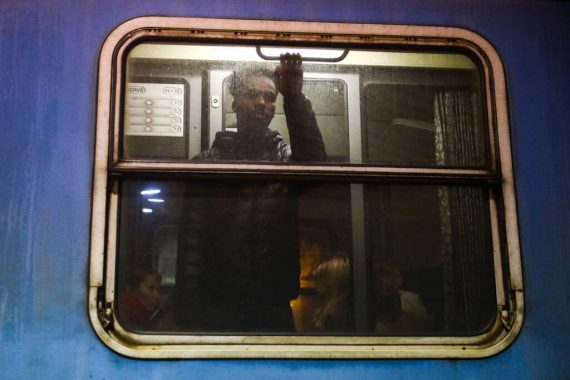As the Russian invasion of Ukraine enters its fourth day, there has been an outpouring of compassion for Ukrainians, which has garnered widespread coverage in international news outlets. With cities around the country under siege, civilians fleeing the conflict, and hundreds of Ukrainians fleeing to neighboring Poland and Belarus, reporters from across the world have not missed the beat in covering the war.
However, as the conflict progressed, several Western news reporters could not hide away from their racist thoughts, as pointed out by various social media handlers.
“This isn’t a place, with all due respect, like Iraq or Afghanistan that has seen conflict raging for decades”, Charles D’Agata CBS news senior reporter noted on Friday, for which he subsequently apologized.
His comments received with harsh criticisms and outrage via social media, with many readers pointing out how his views led to the increasing dehumanization of non-white Christian and non-Europeans suffering from a conflict in mainstream media.
On Saturday, former Ukraine Deputy General Prosecutor David Sakvarelidze spoke to the BBC and further echoed the same virtue signaling and appealing to the average British citizen through relatability, saying, ”It’s very emotional for me because I see European people with blue eyes and blonde hair being killed”.
Biased Media Coverage of Refugees
In the meantime, an ITV News correspondent in Poland had similar comments, stating “This is not a developing third world nation. This is Europe.”
Media commentators, journalists, and political personalities have been accused of hypocrisy for using their platforms to applaud Ukraine’s armed resistance to Russian forces while simultaneously expressing their horror at the prospect of such a battle occurring in a “civilized” society.
The human rights violations committed against millions of people in the Middle East, pushed by authoritarian leaders, masquerading as concerned liberal reformists in the West, further highlights the racial and anti-Muslim subtext of the lives of non- European nations as unimportant because they are judged inferior and therefore “uncivilized.”
The lack of awareness of earlier European wars, from the Russian takeover of Crimea to the Serb-committed Bosnian Genocide, demonstrates the willful misrepresentation of recent European history by purposely portraying the Middle East and Muslim nations as synonymous with war.
Old wounds, new scars: African students fleeing Ukraine
The growing refugee crisis in Ukraine has reopened old scars for international students fleeing the country’s strife. Local hatred and hierarchies, and differing perspectives on what it means to be European are all being solidified.
Tens of thousands of African students are studying medicine, engineering, and military affairs in cities under siege throughout Ukraine. According to the education ministry, Morocco, Nigeria, and Egypt are among the top ten nations having foreign students in Ukraine, accounting for over 16,000 students. Thousands of Indian students are also attempting to exit the country.
The growing refugee crisis in Ukraine has reopened old scars for international students fleeing the country’s strife.
A popular trending hashtag on Twitter has been sharing the worries of Africans leaving Ukraine under the hashtag #AfricansInUkraine, where a young woman told NCA News, “We have to get ourselves to Poland, which is the other way across Ukraine…we’re not given any forms of transportation. All the forms of transportation available are prioritizing Ukrainian citizens”.
Recommended
“It is sickening to know that this was even necessary. In the midst of war, devastation, and people fleeing Ukraine, some working the border have time (and the moral deficit while facing people in despair) for racism” remarked Martin Luther King Jr.’s daughter, civil rights campaigner Bernice King.
Racism is still alive and kicking in Europe
Indeed, xenophobic views against foreigners have remained continuously high across Central Europe over the last decade. The potential for political mobilization of these sentiments is significant and obvious to all political factions, whether they are pro-government forces, secular liberals or extreme nationalists.
According to a 2015 study issued for the UN High Commission for Refugees on ‘Press Coverage of the Refugee and Migrant Crisis in the EU: A Content Analysis of Five European Countries,’ “It is impossible to ignore the role of the mass media in influencing public and elite political attitudes towards asylum and migration. The mass media can set agendas and frame debates. They provide the information which citizens use to make sense of the world and their place within it…”
“Research in many countries has found that refugees and migrants have tended to be framed negatively as a problem, rather than a benefit to host societies…there were very few articles which focused on the need to address the push factors driving population flows”.
The apparent double standards in coverage of the Ukraine war does not lessen the anguish and pain of Ukrainians fleeing to safety and protecting their sovereign territory. It only spotlights those who have been subjected to war and turmoil for a far longer length of time and do not fit the “blue-eyed” mainstream accessibility standard.
Until media analysts, commentators, and journalists report on conflict in Europe in the same way they do in the Middle East, without compromising the facts of each individual conflict but appeal to the viewer’s humanitarian nature, as they did with the Ukraine crisis, will increase confidence in mainstream channels.





